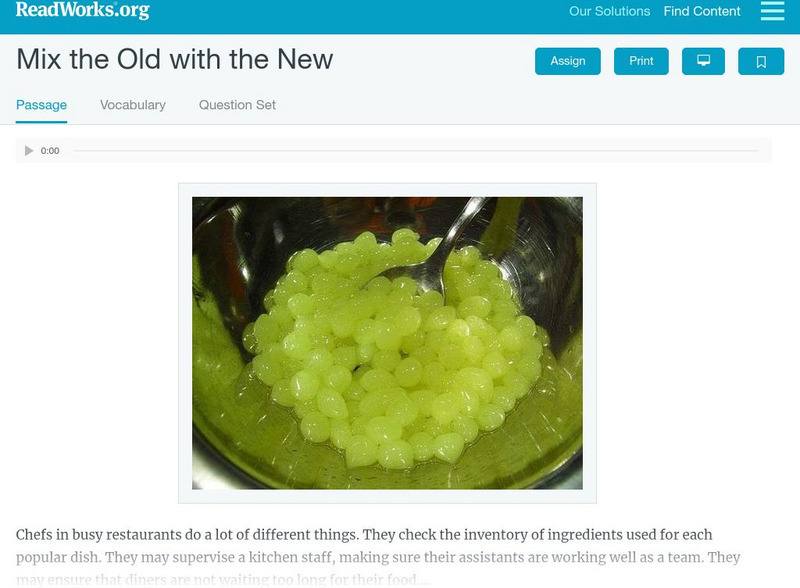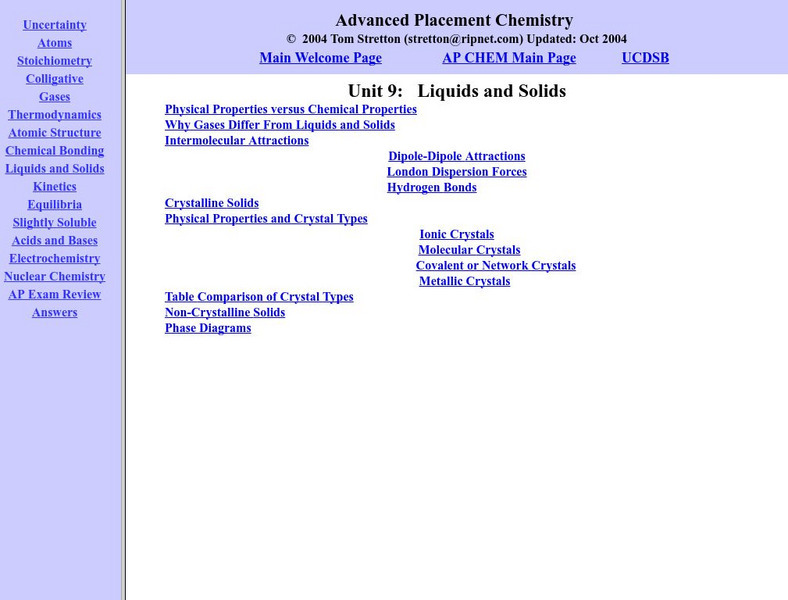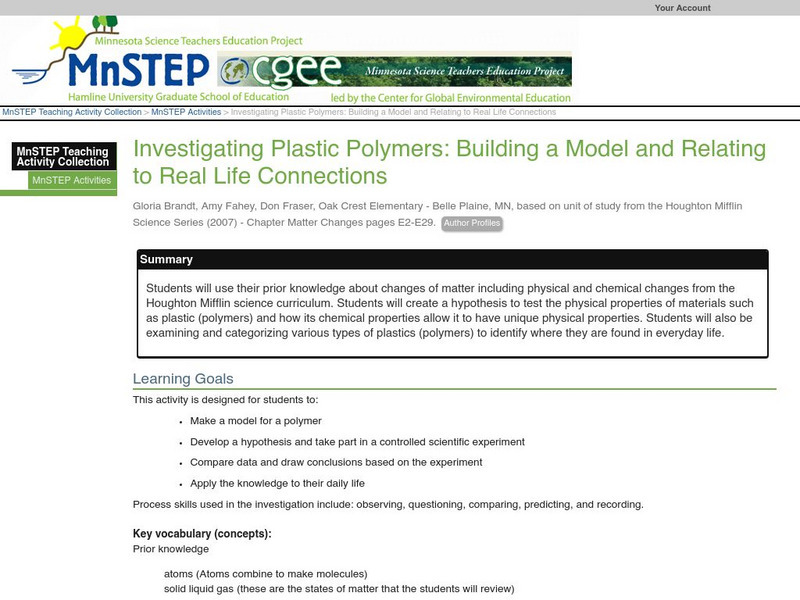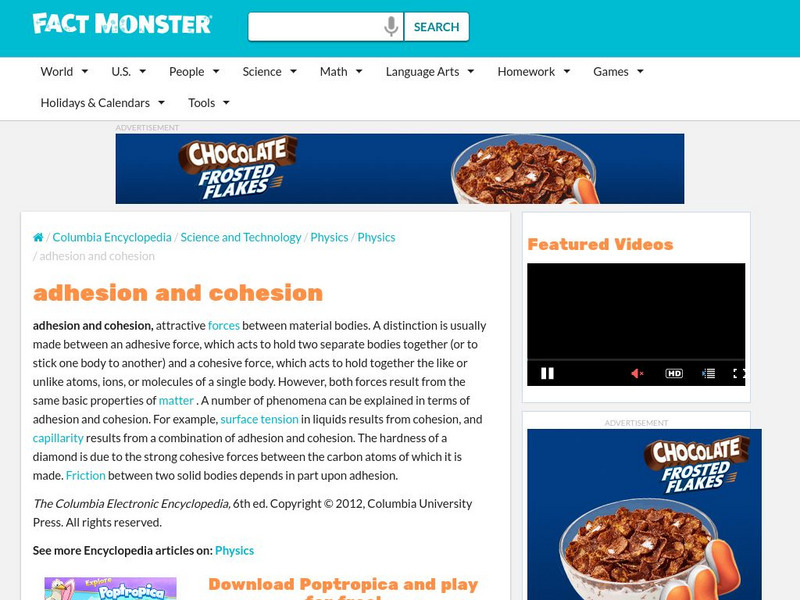Science Education Resource Center at Carleton College
Serc: Polymers & Plastics: Classification & Models
Students will use their prior knowledge about changes of matter including physical and chemical changes to examine and categorize various types of plastics (polymers). They will identify how their chemical properties allow them to have...
TeachEngineering
Teach Engineering: Understanding Elements
This lesson plan examines the properties of elements and the periodic table. Students learn the basic definition of an element and the 18 elements that build most of the matter in the universe. The periodic table is described as one...
Other
Science4us: Materials and Mixtures
Students play games to learn new vocabulary and practice concepts, working to sort mixtures by materials and properties, compare mass, and identify types of materials. Throughout the module, students record their thoughts and findings on...
PBS
Pbs Learning Media: The Ruff Ruffman Show: Dress That Rhino
Use science inquiry to explore, test, and document material properties to help dress up Fluff the Rhino for Ruff's pet-sitting adventures.
CK-12 Foundation
Ck 12: Heat
[Free Registration/Login may be required to access all resource tools.] In this online lesson students will describe how the macroscopic properties of a thermodynamic system such as temperature, specific heat, and pressure are related to...
Read Works
Read Works: Mix the Old With the New
[Free Registration/Login Required] An informational text about how cooking causes changes in matter. A question sheet is available to help students build skills in reading comprehension.
Upper Canada District School Board
Tom Stretton's Advanced Placement Chemistry: Liquids and Solids
Take on this self-guided advanced level e-text, and learn about the chemical and physical structure of liquids and solids.
New York University
New York University: States of Water
Use this resource to learn about the three different phases of water; solid, liquid, and gas. What happens to water as it changes into a solid or gas? Includes short and easy to do activity.
University Corporation for Atmospheric Research
Ucar: Just a Phase: Water as a Solid, Liquid, and Gas
This site helps students construct a model of the arrangement of water molecules when present as solid, liquid or gas. Includes background information, lesson plans, links to standards and assessment ideas.
CK-12 Foundation
Ck 12: Physical Science: Solids
[Free Registration/Login may be required to access all resource tools.] Properties of solid matter and comparison of different types of solids.
Science Education Resource Center at Carleton College
Serc: Investigating Plastic Polymers: Building a Model
Students will use their prior knowledge about changes of matter including physical and chemical changes from the Houghton Mifflin science curriculum. Students will create a hypothesis to test the physical properties of materials such as...
PBS
Pbs Learning Media: The Ruff Ruffman Show: Rainbow Popsicle
Explore kitchen chemistry and make a cool rainbow popsicle.
PBS
Pbs Learning Media: The Ruff Ruffman Show: Teacher's Guide: Kitchen Chemistry
Learn about kitchen chemistry alongside Ruff Ruffman. Students can use the videos, games, and activities from The Ruff Ruffman Show to discover how by investigating solids and liquids and exploring heating and cooling, science can help...
PBS
Pbs Learning Media: The Ruff Ruffman Show: Ruff's Cookie Creator
Use science inquiry to explore and test different ingredients to help Ruff make, decorate, and serve cookies to his family in this kitchen science game.
Fact Monster
Fact Monster: Adhesion and Cohesion
The forces of adhesion and cohesion are compared and contrasted. Various phenomena which can be explained by such forces are identified and discussed.
American Chemical Society
Middle School Chemistry: What Is Density?
Calculate the density of cubes made of different materials to determine what type of material it contains. Using this information explain that the size, mass, and arrangement of the atoms or molecules of a substance determines its density.
Nobel Media AB
The Nobel Prize: Henri Becquerel Nobel Lecture
This site from the Nobel eMuseum of the Nobel Foundation provides a series of links to information on Antoine Henri. Everything from the presentation speech for the Nobel Prize to his biography, the lecture, and other resources.
Open Curriculum
Open Curriculum: Acceleration and Free Fall
These notes and illustrations will help you understand the concept and properties of acceleration.
Open Curriculum
Open Curriculum: Electromagnetism
This article helps explain the concept of electromagnetism as well as magnetic fields and the properties of the speed of light.
Open Curriculum
Open Curriculum: Force and Motion
This article helps students learn about Newton's laws of motion and the properties of force.
Open Curriculum
Open Curriculum: Light as a Particle
Students learn about the properties of light as a photon and the wave-particle duality.
Open Curriculum
Open Curriculum: Relativity and Magnetism
Understand and learn about the properties of space and time and the concept of relativity.
Open Curriculum
Open Curriculum: The Atom
Learn about atoms and their properties of motion with this illustrated article.
Open Curriculum
Open Curriculum: Vectors and Motion
Learn more about the properties of velocity, acceleration, and force vectors in this illustrated article.




















